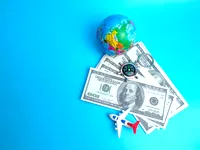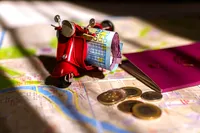Currency in Germany
What Currency Does Germany Use Now

Germany, much like most countries in Europe, uses the Euro (€) as its primary means of exchange. Switching over from the Deutsche Mark in 2002, Germany adopted the use of the Euro at a 1:1.95583 exchange rate. As one of the founding countries of the European Union, Germany's usage of the Euro gives it economic stability and makes it easier for transactions within the Eurozone countries.
The Euro is divided into cents, or 'centimos' in Germany, with denominations of 1, 2, 5, 10, 20, and 50 cents, 1€ and 2€ coins, as well as 5€, 10€, 20€, 50€, 100€, 200€, and 500€ banknotes. While traveling to Germany, keep in mind to carry a varying amount of denominations for ease of transactions.
Credit and Debit Cards in Germany

Credit and debit card usage is quite widespread in Germany. Thoroughly accepted in hotels, restaurants, and most shops, tourists should have no problem if they rely on card payments during their stay. However, there might be some small shops or markets where cash is preferred or necessary.
MasterCard, Visa, and American Express are generally accepted, though MasterCard and Visa are sometimes more preferred by vendors due to lower fees. For debit cards, Germany uses the EC (Electronic Cash) system. While EC cards are predominantly regional, Maestro, a service by Mastercard, is internationally accepted and commonly used.
It is worth noting that contactless payments and mobile payment services like Google Pay and Apple Pay are becoming increasingly prevalent in Germany. It's also wise to inform your bank about your international travels to avoid any sudden blocks on your card due to suspicious foreign transactions.
Using Cash in Germany
While card payments have increased over the years, cash usage is still very common in Germany. In fact, a study by the Bundesbank (Germany's Central Bank) revealed that around 74% of transactions in Germany are still handled with cash. This trend is especially prominent in small service-oriented businesses, bakeries, cosy cafés, and open-air markets where cash is the norm.
Though paying with your card is convenient, carrying enough cash while traveling around Germany is important. Small change is handy, especially for small purchases and rides on public transportation.
ATMs in Germany

ATMs, also known in Germany as Geldautomat, are widely spread across the country. They can be found in banks, shopping malls, large supermarkets, train stations, and airports. Most ATMs in Germany accept the major credit and debit cards – Visa, MasterCard, Cirrus, Plus, and Maestro.
Do beware of foreign transaction fees that can be charged for withdrawing money from ATMs. The fees can add up quickly, so it’s always a good idea to compare your home bank's foreign ATM fees with those of German banks.
In addition, to ensure widespread access to cash, ATMs in Germany are required by law to provide audio assistance for the visually impaired.
Bank Hours
Bank hours in Germany are known for not being as generous as in other countries. Typically, banks open between 8:30 AM and 4:00 PM on weekdays, while closing earlier on Wednesdays and Fridays. Banks are generally closed on weekends; however, some branches may be open on Saturdays.
In major cities, you may find branches that are open until 6:00 PM. Also, it is worth noting that most banks offer 24-hour access to ATM vestibules where you can carry out basic banking transactions.
Planning ahead for your banking needs while in Germany will not only prevent any surprises but also help you budget efficiently for your travel expenses.
